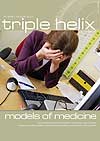On 24 May Marie Stopes International (MSI) broadcast for the first time on British TV an advertisement for its abortion services. However 'sensitive' Are you late? may or may not have been, British women surely are sufficiently aware of how to access abortion services. Television is a powerful medium for influencing decisions and its use was unnecessary, the advert seeking to normalise abortion as a part of life.
The Broadcast Committee of Advertising Practice (BCAP) has reviewed its 2009 public consultation on abortion ads (to which CMF contributed (1) and on 1 March revealed the draft code, enforced from September: 'Advertisements for commercial postconception advice services offering individual advice on personal problems are not acceptable'. (2) However, BCAP says 'commercial' does not include not-for-profit organisations. While Marie Stopes is a charity, it has an income of some £100m pa, much from contracting with the NHS for abortions. MSI may have followed the letter of the law but certainly not the spirit. MSI has courted further controversy by using UK taxpayers' money to fund the opening of abortion clinics in China, money left over from NHS abortions being used internationally. Five clinics have been opened in Jiangsu and there are plans to open three more. (3)
2009 statistics just published (4) show the total number of abortions in England and Wales fell slightly on 2008's, to 189,100. This is down 3.2% on the 195,296 recorded in 2008. Of these, 63,390 of the woman had previously ended a pregnancy, compared with 51,987 a decade ago – a rise of 22%. Some 18,000 abortions were carried out on girls under 18, including more than 1,000 on girls aged 14 or under, and around half of all teenage pregnancies now end in abortion. Peter Saunders commented 'Abortion is simply being used as a form of contraception by a growing percentage of girls and women, and tired policies of values-free sex education, condoms and morning-after pills are not working'. (5)
Further concerns arise after figures published by the Human Fertilisation and Embryology Authority (HFEA) show that about 80 abortions are performed in England and Wales each year on women pregnant after IVF treatment, some of it funded by the NHS. (6) Although an HFEA spokesman commented 'I had no idea there were so many post-IVF abortions and each one is a tragedy', Infertility Network UK explained 'There may be serious problems with the child, or someone's individual circumstances may have changed so profoundly that they no longer feel it is right to have that baby'.
































